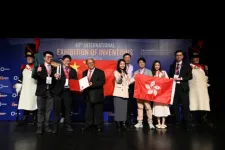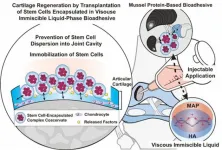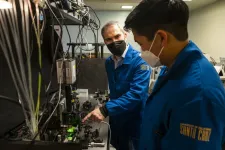(Press-News.org) When we think of boxing, it’s understandable many of us wouldn’t associate it with being ‘good’ for our brains.
However, new Edith Cowan University (ECU) research undertaken in partnership with The Perron Institute and boxer Rai Fazio has shown the sport — without an opponent — could be a valuable way for people suffering Parkinson’s Disease (PD) to improve their quality of life.
Also collaborating with Sir Charles Gairdner Hospital and the University of Western Australia, ECU researchers had 10 people with early-stage PD perform three one-hour boxing sessions per week, over 15 weeks.
Rather than an opponent, the group did battle against a Fightmaster boxing unit, a commercially available device which has 11 padded punching targets mounted to a stand.
The program had three distinct segments: an introduction to boxing, a high-intensity component and a cognitively challenging segment.
Participants completed two-to-three-minute “rounds” where they were required to strike the various pads in different sequences, followed by no more than two minutes of rest.
Dr Travis Cruickshank from ECU’s Centre for Precision Health said boxing has grown in popularity among those living with PD, despite little evidence supporting its use.
“So, what we did was look really robustly at how feasible a boxing program is for people with PD, which hadn’t been done in the past,” he said.
“We used heart rate monitors throughout the intervention so we could see the cardiovascular load on our participants, we used scales that measured their perceived levels of exertion from both a physical and cognitive standpoint.
“We have a lot of the metrics needed to say it’s safe, well tolerated and that people enjoyed it.”
Big benefits
After the 15-week program, nine of the 10 participants improved their score on the Unified Parkinson’s Disease Rating Scale, a tool used to measure the progression and severity of PD.
The group also reported a reduction in fatigue and improvements in sleep.
Dr Cruickshank said that group boxing has the benefit of by combining many aspects of therapy, such as exercise, cognitive stimulation and socialisation into a single exercise.
“In the past, I might have been working with people with Parkinson’s and we’d have exercises in a gym, then a separate computerised cognitive training program, and another event for the social aspect,” he said.
“With boxing, we can combine all of those and deliver it really quickly, which makes it all more enjoyable and people will stick with it.”
A feasible option
Dr Cruickshank said a key aspect of the study was establishing boxing as a feasible option to be prescribed to people living with early-stage PD.
Despite the high intensity of many of the workouts, participants reported no increase in muscle soreness from the program, nor major injuries, which may be expected for people with PD.
Crucially, this meant that every person completed the 15-week program with almost 97 per cent of training sessions completed.
“In fact, after we finished the study, everyone chose to buy a Fightmaster and have it installed in their home,” Dr Cruickshank said.
“So, in the future programs such as this could be run in people’s homes or in clinics, it could be self-administered, supervised in a clinic or done remotely via telehealth so people in regional areas can still be included.
“We know the camaraderie and positive relationships formed between the members in the study also served as a motivator.
“These social benefits cannot be understated, particularly given the link between socialisation and emotional wellbeing.”
Expanding the fight
Dr Cruickshank said the next step was to trial boxing’s therapeutic effectiveness in a larger group of people living with various stages of PD.
He said he believed it could be effective for other neurological conditions such as Huntington’s Disease, multiple sclerosis, stroke and traumatic brain injury and more.
“Beyond these neurological conditions, people with cancer, may also see benefits, particularly to bone mineral content and muscle mass which is impacted by treatments,” he said.
“The ability to adapt the training to someone’s individual state is really important.
Dr Cruickshank said he hoped boxing programs could soon be rolled out in treating PD in the not-too-distant future.
“We know now it’s safe, well-tolerated and people enjoy it,” he said.
“Once we’ve established the therapeutic effectiveness with larger trials — then it will be ready to be implemented in the community.”
END
Boxing can take the fight to Parkinson’s Disease
It's not an activity usually associated with being ‘good’ for our brains, however boxing could be a valuable way for people living with Parkinson’s Disease to improve their quality of life
2023-05-03
ELSE PRESS RELEASES FROM THIS DATE:
HKU’s innovative research novelties excel at 48th International Exhibition of Inventions of Geneva
2023-05-03
The University of Hong Kong (HKU) triumphed at the 48th International Exhibition of Inventions of Geneva, winning a total of 19 awards, including two special grand prizes Invention & Innovation CAI Award (China Delegation), and Prize of the Delegation of Malaysia. The results were announced yesterday (April 28).
Research teams from Faculty of Architecture, Faculty of Engineering, Faculty of Science, LKS Faculty of Medicine, and two HKU Inno Laboratories, established under the Hong Kong Government's InnoHK programme, garnered two special grand prizes, one Gold Medal with the Congratulations of the Jury, six Gold Medals, six Silver Medals ...
A novel stem cell adhesive using mussels
2023-05-03
Cartilage is a tissue that protects bones by providing shock absorption and facilitates smooth joint movement. Unfortunately, due to its limited intrinsic healing capacity, stem cell transplantation is a promising therapeutic approach to address cartilage inflammation and damage, as well as to promote cartilage regeneration. However, a major limitation of this technique is the rapid disappearance of transplanted stem cells from the smooth cartilage surface and fluidic environment around cartilage, resulting in less effective treatment outcomes. Recently, a joint team of researchers from POSTECH, Dongguk University Medical Center, and Nature Gluetech in Korea ...
Virginia Tech researchers study the crowdsourced investigation of Jan. 6, 2021
2023-05-03
How has online sleuthing successfully replaced wanted posters?
Researchers within the Virginia Tech Department of Computer Science answered this question by studying the crowdsourced online investigation that followed the Jan. 6, 2021, insurrection at the U.S. Capitol.
“These online communities can provide real value, if they’re organized in the right way,” said Kurt Luther, associate professor of computer science and history. “These aren’t just digital witch hunts now that make false identifications. They can really make solid contributions to ongoing investigations by getting images in front of people, which ...
Survey: Half of parents believe their children’s mental health suffered due to social media during the past year
2023-05-03
COLUMBUS, Ohio (May 3, 2023) — Concerns continue to grow about the impact social media use has on the mental health and well-being of children and adolescents. According to a new national survey conducted online by The Harris Poll on behalf of The On Our Sleeves Movement For Children’s Mental Health, half (50%) of parents of children younger than 18 feel their child(ren)’s mental health has suffered during the past 12 months because of social media use.
To best understand how social media is impacting their children’s mental health, On Our Sleeves encourages parents and caregivers to sit down and have ...
Engineers tap into good vibrations to power the Internet of Things
2023-05-03
In a world hungry for clean energy, engineers have created a new material that converts the simple mechanical vibrations all around us into electricity to power sensors in everything from pacemakers to spacecraft.
The first of its kind and the product of a decade of work by researchers at the University of Waterloo and the University of Toronto, the novel generating system is compact, reliable, low-cost and very, very green.
“Our breakthrough will have a significant social and economic impact by reducing our reliance on non-renewable power sources,” said Asif Khan, a ...
Texas A&M researcher receives $3M National Science Foundation manufacturing grant
2023-05-02
Dr. Zhijian “Z.J.” Pei and his intercollegiate team recently received the Future Manufacturing Research Grant from the National Science Foundation’s Future Manufacturing program, which funds researchers to develop new manufacturing capability that does not exist today. The focus of this research grant is to substitute products made from petroleum-based plastics or natural wood with biomass.
“Our idea is to use living matter, including fungi, algae, bacteria, plus agriculturally derived biomass and use 3D printing to make products,” said Pei, professor in the Wm Michael Barnes ’64 ...
Crossroads: The role of biomarkers in the management of lumps in the breast
2023-05-02
“A biomarker or set of biomarkers to inform on the individual progression risk would be beneficial to the patient and cost-effective for the healthcare system."
BUFFALO, NY- May 2, 2023 – A new research perspective was published in Oncotarget's Volume 14 on April 24, 2023, entitled, “Crossroads: the role of biomarkers in the management of lumps in the breast.”
Here, Dr. Georg F. Weber from the University of Cincinnati Academic Health Center discusses a long-standing issue in women’s health: ...
Openseize: A novel open-source software to analyze large-scale digital signals
2023-05-02
Electroencephalography (EEG) is an indispensable tool used by clinicians to diagnose neurological diseases and by researchers to study and discover brain circuit mechanisms that support sensory, mnemonic, and cognitive processing. A new software - Openseize - created by Dr. Matthew Caudill, an investigator at the Jan and Dan Duncan Neurological Research Institute at Texas Children’s Hospital and assistant professor at Baylor College of Medicine, can now analyze massive amounts of one-dimensional digital ...
JSA Awards $558K for Initiatives Fund Program for FY2023
2023-05-02
WASHINGTON, DC – Jefferson Sciences Associates (JSA) has announced the award of $558,060 through its JSA Initiatives Fund Program. The program supports projects by staff and scientific users at the U.S. Department of Energy’s Thomas Jefferson National Accelerator Facility. The FY23 program awards leveraged over $800,000 in matching funds, and taken together, the program and matching awards total over $1.3 million. Project awards include scientific meeting support, education and career development, and outreach activities, ...
Deep neural network provides robust detection of disease biomarkers in real time
2023-05-02
Sophisticated systems for the detection of biomarkers — molecules such as DNA or proteins that indicate the presence of a disease — are crucial for real-time diagnostic and disease-monitoring devices.
Holger Schmidt, distinguished professor of electrical and computer engineering at UC Santa Cruz, and his group have long been focused on developing unique, highly sensitive devices called optofluidic chips to detect biomarkers.
Schmidt’s graduate student Vahid Ganjalizadeh led an effort to use machine learning to enhance ...
LAST 30 PRESS RELEASES:
Fund for Science and Technology awards $15 million to Scripps Oceanography
New NIH grant advances Lupus protein research
New farm-scale biochar system could cut agricultural emissions by 75 percent while removing carbon from the atmosphere
From herbal waste to high performance clean water material: Turning traditional medicine residues into powerful biochar
New sulfur-iron biochar shows powerful ability to lock up arsenic and cadmium in contaminated soils
AI-driven chart review accurately identifies potential rare disease trial participants in new study
Paleontologist Stephen Chester and colleagues reveal new clues about early primate evolution
UF research finds a gentler way to treat aggressive gum disease
Strong alcohol policy could reduce cancer in Canada
Air pollution from wildfires linked to higher rate of stroke
Tiny flows, big insights: microfluidics system boosts super-resolution microscopy
Pennington Biomedical researcher publishes editorial in leading American Heart Association journal
New tool reveals the secrets of HIV-infected cells
HMH scientists calculate breathing-brain wave rhythms in deepest sleep
Electron microscopy shows ‘mouse bite’ defects in semiconductors
Ochsner Children's CEO joins Make-A-Wish Board
Research spotlight: Exploring the neural basis of visual imagination
Wildlife imaging shows that AI models aren’t as smart as we think
Prolonged drought linked to instability in key nitrogen-cycling microbes in Connecticut salt marsh
Self-cleaning fuel cells? Researchers reveal steam-powered fix for ‘sulfur poisoning’
Bacteria found in mouth and gut may help protect against severe peanut allergic reactions
Ultra-processed foods in preschool years associated with behavioural difficulties in childhood
A fanged frog long thought to be one species is revealing itself to be several
Weill Cornell Medicine selected for Prostate Cancer Foundation Challenge Award
Largest high-precision 3D facial database built in China, enabling more lifelike digital humans
SwRI upgrades facilities to expand subsurface safety valve testing to new application
Iron deficiency blocks the growth of young pancreatic cells
Selective forest thinning in the eastern Cascades supports both snowpack and wildfire resilience
A sea of light: HETDEX astronomers reveal hidden structures in the young universe
Some young gamers may be at higher risk of mental health problems, but family and school support can help
[Press-News.org] Boxing can take the fight to Parkinson’s DiseaseIt's not an activity usually associated with being ‘good’ for our brains, however boxing could be a valuable way for people living with Parkinson’s Disease to improve their quality of life






